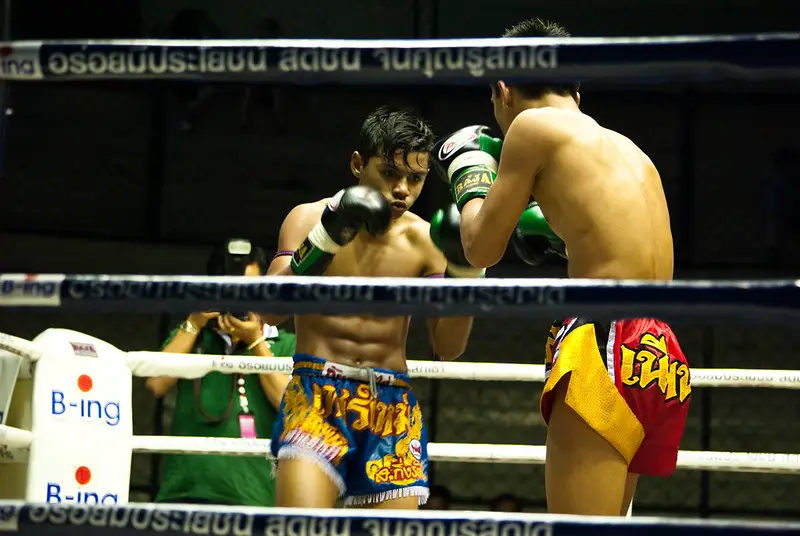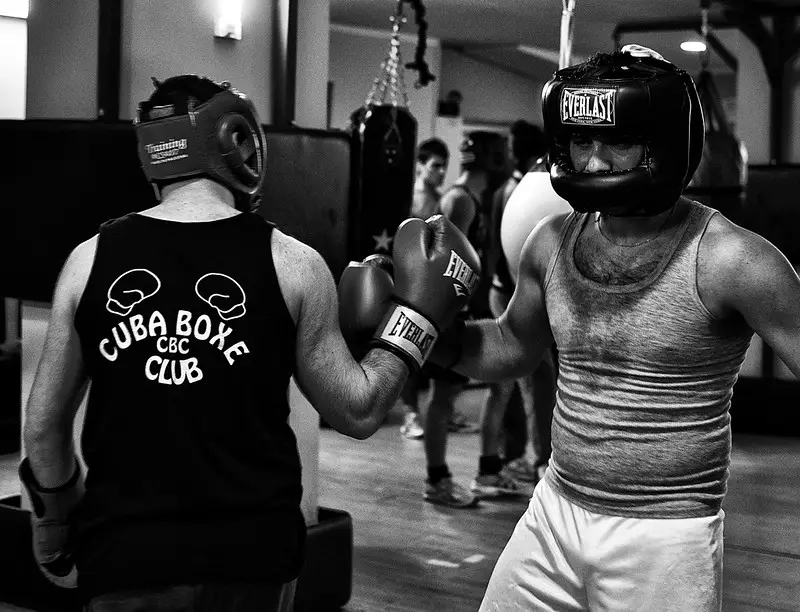Fueling your body with proper Muay Thai food before and after Muay Thai training is crucial for performance, energy levels, and recovery. Just like the car engine needs the right oil and fuel, your body also needs the right nutrients to operate at such a high level.
Here are some guidelines for what to eat before and after your training sessions:
What To Eat Before Muay Thai Session
Muay Thai pre-workout meal should include a balanced meal rich in complex carbs, lean protein, and healthy fats at least 2–3 hours ahead of training.
This will provide sustained energy and support muscle function during your session. But avoid heavy meals and eating too much food.
Example Pre-Training Meal:
- Grilled chicken breast (200g) with brown rice (100g) and steamed broccoli (100g) and avocado slices (50g)
- Grilled salmon fillet (150g), spinach (100g), cherry tomatoes (50g)
- Rolled oats (50–100g), Almond milk (200ml), banana slices (100g) and mixed barriers (50g)
Here is how you can easily make your own Muay Thai pre-workout meal by combining the following nutrients:
| Lean Protein | Complex Carbs | Healthy Fats |
| Grilled Chicken Breast | Brown Rice | Avocado |
| Turkey Breast | Quinoa | Almonds |
| Baked Salmon | Sweet Potato | Walnuts |
| Tofu | Oatmeal | Chia Seeds |
| Greek Yogurt | Whole-Grain Pasta | Flaxseeds |
- Complex Carbs — consuming carbs a couple of hours before training can provide a steady source of energy. It’s essential to choose nutrient-dense sources of complex carbs to provide the necessary energy and support overall health and well-being. Opt for whole grains like brown rice, quinoa, oatmeal, or whole-grain bread.
- Lean Protein helps repair and rebuild muscles, making it essential for muscle recovery after training. Include sources such as chicken, turkey, fish, tofu, or beans in your pre-training meal.
- Healthy Fats — Incorporating healthy fats into your pre-training meal can help sustain energy levels. Avocados, nuts, seeds, and olive oil are good sources of healthy fats.
- Hydration: Make sure you’re well-hydrated before training. Drink water throughout the day leading up to your session, and consider consuming a small amount of water or a sports drink about 30 minutes before training to ensure proper hydration.
Be sure to stay away from heavy meals and overeating. Large, heavy meals can make you feel sluggish during training. Opt for a balanced meal that provides energy without weighing you down.
What To Eat After A Muay Thai Session
Muay Thai post-workout food should also be a combination of protein and carbs taken within 30 minutes to an hour to support muscle recovery and replenish glycogen stores.
Also, don’t forget to hydrate. Drink water or electrolyte-containing beverages to replace fluids lost during exercise and aid in recovery.
Example Post-Training Snacks or Meals:
- Grilled salmon with sweet potatoes and steamed broccoli
- Greek yogurt with berries and honey
- Turkey and avocado wrap with whole grain tortilla
- Protein smoothie with banana, spinach, and almond milk
Consuming protein after training is crucial for muscle recovery and growth. Aim to consume protein within 30 minutes to an hour after your session. Good sources include whey protein shakes, chicken, fish, eggs, or tofu.
Next, replenishing glycogen stores after training is important for recovery and energy levels. Opt for whole grains, fruits, or starchy vegetables.
Also, rehydrate your body after training by drinking water or a sports drink containing electrolytes. Replenishing lost fluids helps prevent dehydration and supports recovery.
If you’ve sweated a lot during your training session, you may need to replenish electrolytes lost through sweat. Consider consuming a sports drink or coconut water to replenish electrolyte levels.
Muay Thai Daily Eating Plan (3000 calories)
Creating a daily eating plan for Muay Thai training with 3000 calories requires a balance of macronutrients to support energy needs, muscle recovery, and performance. Here’s a sample plan:
Breakfast (700 calories):
- Scrambled Eggs: 3 whole eggs cooked with vegetables like spinach, bell peppers, and onions (300 calories)
- Whole Grain Toast: 2 slices of whole grain toast (200 calories)
- Avocado: 1/2 avocado sliced on toast (120 calories)
- Greek Yogurt: 1 cup of Greek yogurt topped with berries and a drizzle of honey (80 calories)
Mid-Morning Snack (300 calories):
- Protein Smoothie: Blend 1 scoop of whey protein powder, 1 banana, 1 cup of spinach, and almond milk (300 calories)
Lunch (700 calories):
- Grilled Chicken Salad: Grilled chicken breast sliced over mixed greens, cherry tomatoes, cucumbers, and a sprinkle of nuts or seeds with olive oil and vinegar dressing (500 calories)
- Quinoa: 1 cup of cooked quinoa on the side (200 calories)
Afternoon Snack (300 calories):
- Whole Grain Crackers: 10 whole grain crackers (150 calories)
- Almond Butter: 2 tablespoons of almond butter for dipping (200 calories)
Pre-Workout Snack (200 calories):
- Banana: 1 banana (100 calories)
- Almonds: 1 ounce of almonds (100 calories)
Post-Workout Meal (600 calories):
- Salmon Fillet: Grilled or baked salmon fillet (approx. 6 oz) (400 calories)
- Sweet Potatoes: 1 large sweet potato, baked (200 calories)
Dinner (800 calories):
- Lean Beef Stir-Fry: Stir-fry lean beef strips with mixed vegetables (bell peppers, broccoli, snap peas) in a light soy sauce or teriyaki sauce served over brown rice (600 calories)
- Stir-Fry Sauce: 2 tablespoons (30ml) of soy sauce or teriyaki sauce (100 calories)
- Brown Rice: 1 cup of cooked brown rice (200 calories)
Before Bed Snack (200 calories):
- Cottage Cheese: 1 cup of low-fat cottage cheese (200 calories)
This Muay Thai daily eating plan provides a balance of protein, carbs, and healthy fats to support energy needs, muscle recovery, and overall health for Muay Thai training.
Adjust portion sizes and food choices based on individual preferences, dietary restrictions, and training intensity. Additionally, remember to stay hydrated throughout the day by drinking water regularly.
How Many Calories You Can Burn with Muay Thai?
On average, a person weighing around 155 pounds (70 kilograms) can expect to burn approximately 590–930 calories per hour of moderate to high-intensity Muay Thai training.
| Weight (kg) | Weight (lbs) | Calorie Burn (Low Intensity) | Calorie Burn (Moderate Intensity) | Calorie Burn (High Intensity) |
| 70 | 154 | 590 | 740 | 930 |
| 80 | 176 | 670 | 840 | 1055 |
| 90 | 198 | 750 | 940 | 1180 |
| 100 | 220 | 830 | 1040 | 1305 |
Still, The number of calories burned during one hour of Muay Thai training can vary depending on several factors, including your weight, intensity of the training session, and individual metabolism.
Individuals who weigh more or exert more effort during their training may burn more calories, while those who weigh less or engage in less intense activity may burn fewer calories. But overall, Muay Thai is one of the best martial arts for losing weight, especially when you combined it with the right food to maximize the weight loss.
How Much Water Should You Drink?
About 30 minutes before training, consume approximately 16–20 ounces (475–590 ml) of water to ensure you’re adequately hydrated before the session begins. This helps optimize performance and prevent dehydration during exercise.
After your training session, prioritize rehydration to replace fluids lost through sweat. Aim to drink at least 16–24 ounces (475–710 ml) of water or a sports drink containing electrolytes within the first hour post-exercise.
Continue drinking water throughout the remainder of the day to replenish fluids and support recovery. Monitor your urine color and aim for pale yellow urine as an indicator of proper hydration.
However, individual hydration needs can vary based on factors such as body weight, sweat rate, environmental conditions, and training intensity.
If you’ve sweated heavily during your training session, consider replenishing electrolytes lost through sweat by consuming a sports drink or coconut water in addition to water.
Final Thoughts on the Muay Thai Food
Proper Muay Thai food nutrition and hydration play vital roles in optimizing performance and supporting recovery before and after Muay Thai training sessions.
Pre-training meals should focus on balanced combinations of complex carbs, lean protein, and healthy fats to provide sustained energy and support muscle function.
Post-training nutrition should prioritize replenishing glycogen stores with a combination of protein and carbohydrates, accompanied by adequate hydration to replace fluids lost through sweat.
Additionally, individualized meal plans tailored to specific caloric needs and dietary preferences can further enhance training outcomes. By fueling the body appropriately and staying hydrated, practitioners can maximize their training potential, promote muscle recovery, and maintain overall health and well-being in their Muay Thai journey.
How To Increase Kicking Power (Workouts Included)


